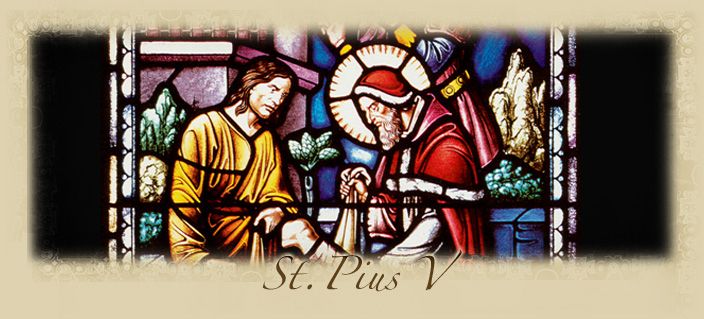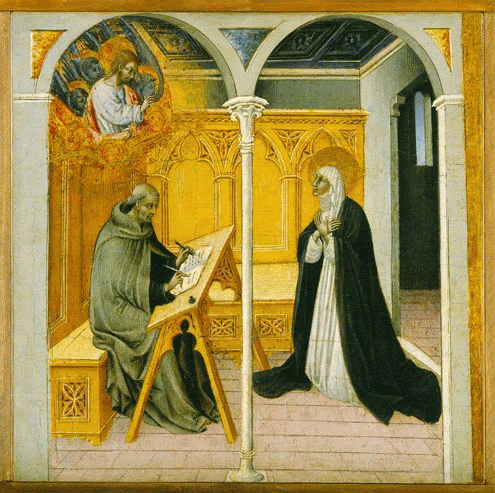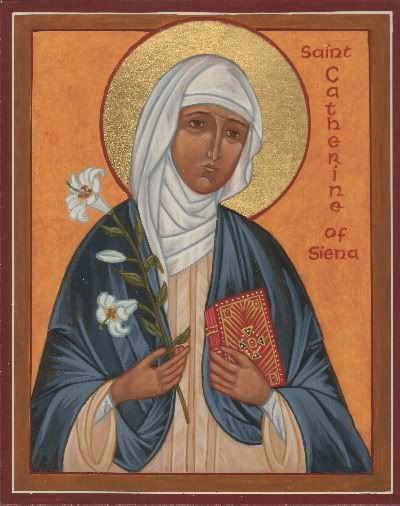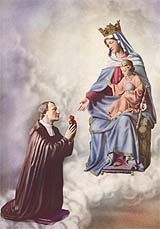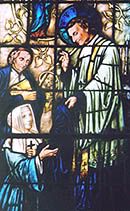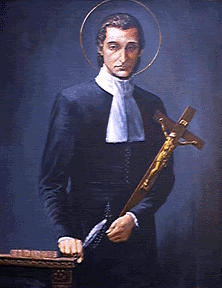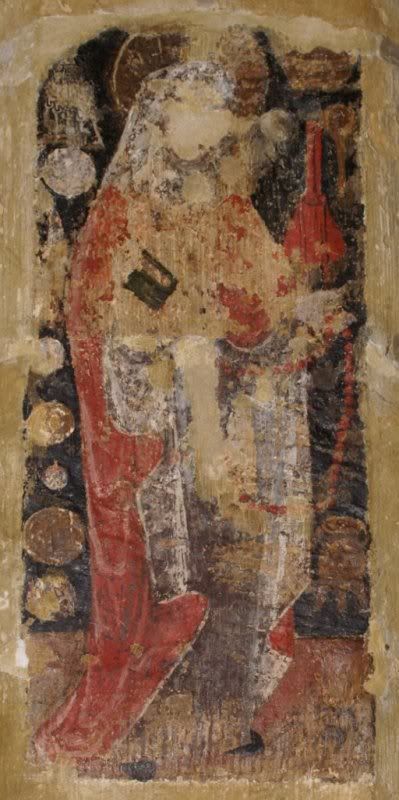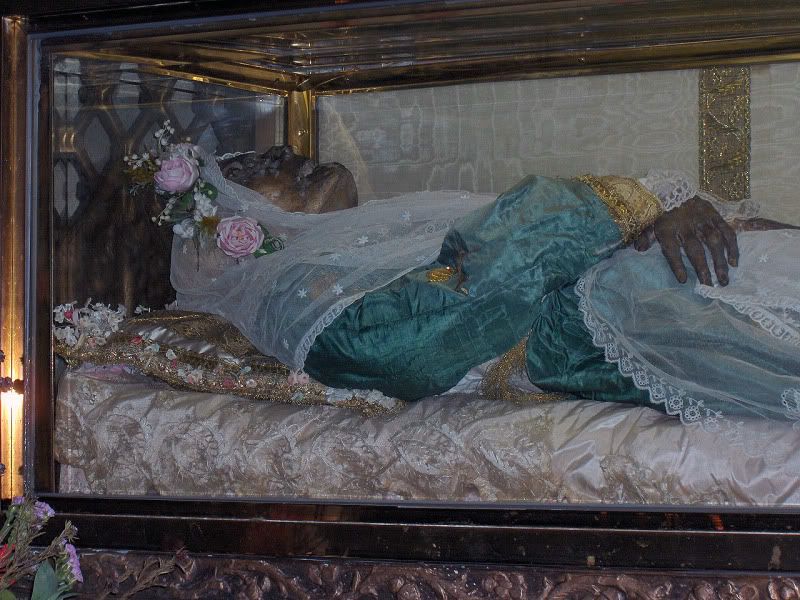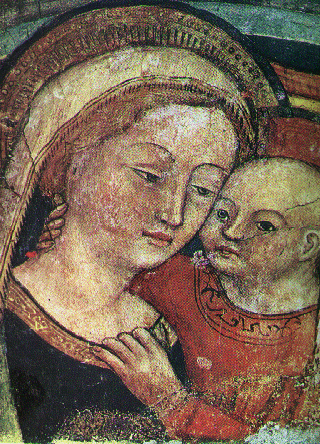Today, April 30, we celebrate the feast of Pope Saint Pius V (1504-1572), confessor, reformer, and “Pope of the Holy Rosary.” Throughout his life and papacy, Pope Pius V worked to reform and solidify Catholic unity, securing the traditional Latin Rite of Mass, establishing seminaries, and publishing works to be used in churches throughout the world. Along with this, Pope Pius V lived the simple life of a Dominican, refusing the riches and luxuries thrust upon him, and instead ministering to the poor and needy. Through his deep devotion and prayers to Our Blessed Mother, the Battle of Lepanto was decisively won for Christendom.
Born Michael Ghislieri to a poor, but noble family in Bosco, Italy, the future pope was raised with an excellent education in piety and holiness. As a child he tended the family’s sheep in the fields, but entered the Dominican Order at age fourteen, where he excelled at his studies. Recognized as a gifted scholar and observed to have a deep relationship with the Lord, Michael was appointed a lecturer in philosophy and theology at Pavia, and very early became involved in the reform movement in the Church.
At the age of 24, Michael was ordained a priest and continued his teaching of philosophy an divinity in Genoa. For the next sixteen years, Michael traveled to various Dominican houses and encouraged a stricter following of the Order's Rule with both words and example. These reforming labors brought him to the attention of other members of the reform movement, and he was given important positions (first Inquisitor, and then placed as authority over the Inquisition) in Como, Bergamo, and Rome.
In 1556, Michael was consecrated bishop of Sutri and Nepi, somewhat against his will, and later appointed to the diocese of Mondevi which had been ravaged by war. In a very short time, under his spiritual direction, the diocese was flourishing and prosperous. Michael worked to lead his flock with words and example and served as a continual messenger encouraging personal piety and devotion to God. Before long, he was elevated to the College of cardinals. His views on reform were often asked by the Holy Father, and he was noted for his boldness in expressing his views.
In December of 1565, Pope Pius IV died. Having successfully engineered the Council of Trent, his replacement would be charged with carrying out the decrees of the council. Somewhat surprisingly, Michael—a simple Dominican friar—was selected to ascend to the Chair of Peter. It was the late pontiff's nephew, Saint Charles Borromeo, who was the driving force in the election of Michael as the new pope, for he recognized that a remarkable leader would be needed if the decrees of the council were to bear fruit.
Michael took the name Pius V, and immediately set about reforming the Church and enforcing the decrees of Trent. His holiness and austerity of life were notable, and he succeeded in bringing simplicity even into the papal household. He refused to wear the flowing garments of previous popes and insisted upon wearing his white Dominican habit even as head of the Church. To this day, the pope wears white, a custom begun by this Dominican pontiff.
He began his pontificate by giving large alms to the poor, ill, and needy. In his charity he visited the hospitals, and sat by the bedside of the sick, consoling them and preparing them to die. He washed the feet of the poor, and embraced the lepers. As pontiff he practiced the virtues he had displayed as a monk and a bishop. His piety was not diminished, and, in spite of the heavy labors and anxieties of his office, he made at least two meditations a day on bended knees in presence of the Blessed Sacrament. He insisted on austerity and banished luxury from his court, raised the standard of morality.
Pope Pius V further labored with his friend, Saint Charles Borromeo, to lay a solid foundation and spread the Faith, preserving the doctrine of the Church. Through papal decrees and example, Pope Pius reformed the clergy, obliged his bishops to reside in their dioceses, and the cardinals to lead lives of simplicity and piety. He reformed the Cistercians, and supported the missions of the New World. Under his direction, seminaries were established, diocesan synods were held, and the Breviary and Missal were reformed. Pope Pius V published catechisms, ordered a revision of the Latin Vulgate, and revitalized the study of theology and canon law. Pope Pius also established the Confraternity of Christian Doctrine (CCD) classes for the young.
In striving to reform both Church and state, Pius encountered vehement opposition from England's Queen Elizabeth (who he excommunicated) and the Roman Emperor Maximilian II. Problems in France and in the Netherlands also hindered the pope’s hopes for a Europe united against the Turks. Only at the last minute, through considerable effort, was he able to organize a fleet which won a decisive victory in the Gulf of Lepanto, off Greece, on October 7, 1571. The defeat of the Turks at Lepanto, is recognized as the result of his prayers and efforts to Our Blessed Mother, Our Lady of the Rosary. Before the victorious fleet returned to Rome, the pope had had knowledge of the victory through a miraculous vision of Mary. He proclaimed a period of thanksgiving and placed the invocation "Mary, Help of Christians" in the Litany of Loreto, establishing the feast in commemoration of the victory.
His faith and devotion to Mary was made evident through his example, as well as his papal writings. In his “Consuieverunt Romani,” published in 1569, Pope Pius V wrote about the power and devotion of the Holy Rosary:
The Roman Pontiffs, and the other Holy Fathers, our predecessors, when they were pressed in upon by temporal or spiritual wars, or troubled by other trials, in order that they might more easily escape from these, and having achieved tranquility, might quietly and fervently be free to devote themselves to God, were wont to implore the divine assistance, through supplications or Litanies to call forth the support of the saints, and with David to lift up their eyes unto the Mountains, trusting with firm hope that thence would they receive aid.
1. Prompted by their example, and, as is piously believed, by the Holy Ghost, the inspired Blessed founder of the Order of Friars Preachers, (whose institutes and rule we ourselves expressly professed when we were in minor orders), in circumstances similar to those in which we now find ourselves, when parts of France and of Italy were unhappily troubled by the heresy of the Albegenses, which blinded so many of the worldly that they were raging most savagely against the priests of the Lord and the clergy, raised his eyes up unto heaven, unto that mountain of the Glorious Virgin Mary, loving Mother of God. For she by her seed has crushed the head of the twisted serpent, and has alone destroyed all heresies, and by the blessed fruit of her womb has saved a world condemned by the fall of our first parent. From her, without human hand, was that stone cut, which, struck by wood, poured forth the abundantly flowing waters of graces. And so Dominic looked to that simple way of praying and beseeching God, accessible to all and wholly pious, which is called the Rosary, or Psalter of the Blessed Virgin Mary, in which the same most Blessed Virgin is venerated by the angelic greeting repeated one hundred and fifty times, that is, according to the number of the Davidic Psalter, and by the Lord's Prayer with each decade. Interposed with these prayers are certain meditations showing forth the entire life of Our Lord Jesus Christ, thus completing the method of prayer devised by the by the Fathers of the Holy Roman Church. This same method St. Dominic propagated, and it was, spread by the Friars of Blessed Dominic, namely, of the aforementioned Order, and accepted by not a few of the people. Christ's faithful, inflamed by these prayers, began immediately to be changed into new men. The darkness of heresy began to be dispelled, and the light of the Catholic Faith to be revealed. Sodalities for this form of prayer began to be instituted in many places by the Friars of the same Order, legitimately deputed to this work by their Superiors, and confreres began to be enrolled together.
2. Following the example of our predecessors, seeing that the Church militant, which God has placed in our hands, in these our times is tossed this way and that by so many heresies, and is grievously troubled and afflicted by so many wars, and by the deprave morals of men, we also raise our eyes, weeping but full of hope, unto that same mountain, whence every aid comes forth, and we encourage and admonish each member of Christ's faithful to do likewise in the Lord.
Pope Pius V died in 1572, at the age of sixty-eight, still tirelessly serving the Church. His relics were placed in the Basilica of Mary Major, as a tribute to his eternal devotion to the Blessed Virgin, where they are venerated today.
Father,
You chose Saint Pius V as pope of Your Church
to protect the faith and give You more fitting worship.
By his prayers,
help us to celebrate Your holy mysteries
with a living faith and an effective love.
We ask this through our Lord Jesus Christ, Your Son,
who lives and reigns with You and the Holy Spirit,
one God, for ever and ever. Amen
Why pray the Rosary every day for a year?
Each time the Blessed Virgin has appeared-- whether it be to Saint Bernadette Soubirous at Lourdes; to Lucia, Jacinta, and Francisco at Fatima; or to Mariette Beco at Banneux-- she has asserted the importance, saving grace, and power of praying the Holy Rosary on a daily basis. Based upon her words, the Rosary is penance and conversion for sinners, a pathway to peace, an end to war, and a powerful act of faith in Jesus Christ. Pope Paul VI presented the Rosary as a powerful means to reach Christ "not merely with Mary but indeed, insofar as this is possible to us, in the same way as Mary, who is certainly the one who thought about Him more than anyone else has ever done."
To show us how this is done, perhaps no one has been more eloquent than the great Cardinal Newman, who wrote: "The great power of the Rosary consists in the fact that it translates the Creed into Prayer. Of course, the Creed is already in a certain sense a prayer and a great act of homage towards God, but the Rosary brings us to meditate again on the great truth of His life and death, and brings this truth close to our hearts. Even Christians, although they know God, usually fear rather than love Him. The strength of the Rosary lies in the particular manner in which it considers these mysteries, since all our thinking about Christ is intertwined with the thought of His Mother, in the relations between Mother and Son; the Holy Family is presented to us, the home in which God lived His infinite love."
As Mary said at Fatima, "Jesus wants to use you to make Me known and loved. He wishes to establish the devotion to My Immaculate Heart throughout the world. I promise salvation to whoever embraces it; these souls will be dear to God, like flowers put by Me to adorn his throne."

Saint Catherine was born the 23rd child of a poor wool dyer in Northern Italy. She was marked by the sign of holiness from a young age, clearly experiencing visions by the age of six in which she saw both her neighbors and their guardian angels simultaneously. That same year, at age 6, she was observed to fall into a religious ecstasy while reporting a vision of Christ, dressed as the pope, and the apostles. In her vision, Christ blessed her, anointing her with her earthly mission. As she aged, her intelligence and beauty grew, along with her piety. As she approached marrying age, her mother encouraged her to look for a spouse, but Catherine instead cut off her hair (to make herself less attractive) and committed herself to a life of prayer and meditation, consecrated a virgin bride of Christ. While her mother was distraught, her father encouraged her, setting aside a room of the family’s small home for Catherine to use in pursuit of her spiritual endeavors.
At age sixteen, Catherine took the habit of the Dominican Tertiaries (Third Order of Saint Dominic), where she continued to have ecstatic visions of Christ, Our Blessed Mother, and the saints. During these visions, she engaged in familiar conversations with Christ over three years, and underwent the mystical experience of “mystical espousal” to Christ.
Despite her lack of formal education, the writings of Saint Catherine are regarded as treasures of the Church, and her mind one of the most brilliant theological minds throughout the ages. She was a prolific writer, the most famous of her works being The Dialogue, which she dictated while experiencing her ecstatic visions and conversations with Christ. In this work, she expounds on the mysteries of the Church, the Creed, the sinfulness of man, and the divine mercy of the Lord.
Saint Catherine experienced visions of both heaven and hell while on earth. She worked tirelessly, through letters (over 400!) and counsel to church and world leaders—including Pope Gregory XI and various kings and queens of the time. Her goal was church reform, inspired by her visions of Christ, and her call to public service. Saint Catherine devoted her free time to the poor and ill, and the conversion of sinners. Five years prior to her death, Catherine was graced with the stigmata, although she kept this a secret due to her humility. Saint Catherine is said to have eaten very little during her life, with the exception of Holy Eucharist each day. She bore continuous stomach ailment and discomfort without complaint, uniting her suffering to that of Christ. Saint Catherine engaged in severe forms of mortification, wearing a metal shirt which cut into her hips, beating herself with a chain for her own sins (and those of others), sleeping on a wooden bench, and oftentimes refusing to speak. For Catherine, the greater her suffering, the greater the triumph of heaven!
During her lifetime, the Church experienced great turmoil, which Catherine sought to reconcile. She offered herself and her life as a victim for the Church in it’s agony. Saint Catherine died when she was only 33, and upon exhumation of her body over 100 years later, was found to be incorrupt. Her head and thumb, miraculously smuggled out of Rome during time of persecution (upon examination by guards, the bag in which her head was hidden was observed to be filled with rose petals, but upon moving past the guards, the roses disappeared and the holy face of Saint Catherine returned), were returned to Siena, where they remain incorrupt in the Basilica of San Domenico. Numerous miracles have been recorded through her intercession.
The life and inspiration of Saint Catherine of Siena can best be found in her words, preserved in over 400 letters written in her hand, numerous prayers, as well as in The Dialogue. Selected quotations are presented below. The words of Saint Catherine remind us of our faith, of our weakness and sinfulness, and of the unending love and mercy of the Lord. In her words, everything we do should begin in love—love for our neighbors, love for our Lord, love for ourselves. The Lord does nothing without love in mind, and Saint Catherine reminds us that neither should we!
Selected Writings of Saint Catherine of Siena
“So take a lesson from the true father and shepherd. For you see that now is the time to give your life for the little sheep who have left the flock. You must seek and win them back by using patience and war–by war I mean by raising the standard of the sweet blazing cross and setting out against the unbelievers. so you must sleep no longer, but wake up and raise that standard courageously. I am confident that by God’s measureless goodness you will win back the unbelievers and [at the same time] correct the wrongdoing of Christians, because everyone will come running to the fragrance of the cross, even those who have rebelled against you most.”
“No one should judge that he has greater perfection because he performs great penances and gives himself in excess to the staying of the body than he who does less, inasmuch as neither virtue nor merit consists therein; for otherwise he would be an evil case, who for some legitimate reason was unable to do actual penance. Merit consists in the virtue of love alone, flavored with the light of true discretion without which the soul is worth nothing."
"If not for my sins, the world would be a better place."
“You know that the devil is not cast out by the devil, but by virtue.”
"There is no perfect virtue-none that bears fruit- unless it is exercised by means of our neighbor."
“Charity is the sweet and holy bond which links the soul with its Creator: it binds God with man and man with God.”
“Eternal Trinity, Godhead, mystery deep as the sea, you could give me no greater gift than the gift of yourself. For you are a fire ever burning and never consumed, which itself consumes all the selfish love that fills my being. Yes, you are a fire that takes away the coldness, illuminates the mind with its light, and causes me to know your truth. And I know that you are beauty and wisdom itself. The food of angels, you gave yourself to man in the fire of your love.”
“Everything comes from love, all is ordained for the salvation of man, God does nothing without this goal in mind.”
“And let the truth be your delight; let it always be in your mouth, and proclaim it when it is needed. Proclaim it lovingly and to everyone, especially those whom you love with a special love---but with a certain congeniality, putting the shortcomings of the other person on your own shoulders. If in the past you haven't done it as sensitively as you should, let's do better in the future.”
“I long to see you a productive tree planted in fertile soil and laden with sweet mellow fruit. For a tree uprooted from the soil (I mean the soil of true self-knowledge) would dry up and bear no fruit.”
“We lack nothing but virtue and hunger for the salvation of souls---but there is a remedy for this, father: that we do away with loving ourselves or anyone or anything else apart from God. Let us concentrate no longer on friends or relatives or on our own material needs, but only on virtue and the promotion of spiritual matters. For the only reason you are wanting for material things is your abandonment of concern for the spiritual.”
“Learn from the Master of truth, who preached virtue only after he had practiced it.... To this wonderful school, then, my children!... Open your ears, I tell you, to hear his teaching --- and it is this: voluntary poverty; patience in the face of injury; returning good to those who do us evil; being little, humble, oppressed and forsaken in the world; with ridicule, torment, wrongs, insults, detraction, gossip, difficulties, and harassment from the world.... No more indifference, then! No more sleeping in unawareness! No, with bold and blazing heart stretch your sweet loving desires to go and give honor to God and your best efforts to your neighbors, never losing sight of your objective, Christ crucified.”
"Love is the most necessary of all virtues. Love in the person who preaches the word of God is like fire in a musket. If a person were to throw a bullet with his hands, he would hardly make a dent in anything; but if the person takes the same bullet and ignites some gunpowder behind it, it can kill. It is much the same with the word of God. If it is spoken by someone who is filled with the fire of charity- the fire of love of God and neighbor- it will work wonders."
"Everything comes from love, all is ordained for the salvation of man, God does nothing without this goal in mind."
"Merit consists in the virtue of love alone, flavored with the light of true discretion without which the soul is worth nothing."
"Strange that so much suffering is caused because of the misunderstandings of God's true nature. God's heart is more gentle than the Virgin's first kiss upon the Christ. And God's forgiveness to all, to any thought or act, is more certain than our own being."
“When then, eternal Father, did you create this creature of yours?…You show me that you made us for one reason only: in your light you saw yourself compelled by the fire of your love to give us being in spite of the evil we would commit against you, eternal Father. It was fire, then, that compelled you. Oh, unutterable love, even though you saw all the evils your creatures would commit against your infinite goodness, you acted as if you did not see and set your eye on the beauty of your creature, with whom you had fallen in love like one drunk and crazy with love…You are the fire, nothing but a fire of love, crazy over what you have made.”
“My Lord, turn the eye of your mercy on your people and on your mystic body, holy Church. How much greater would be your glory if you would pardon so many and give them the light of knowledge! For then they would surely all praise you, when they see that your infinite goodness has saved them from deadly sin and eternal damnation. How much greater this than to have praise only from my wretched self....
So I beg you, divine eternal love, to take your revenge on me, and be merciful to your people. I will not leave your presence till I see that you have been merciful to them.”
Prayers Composed by Saint Catherine of Siena
Holy Spirit, come into my heart, by your power I journey to You, God, and grant me charity with fear. Protect me, o Christ, from every evil thought, warm me with Your sweet love, so that each burden seems light to me. My holy Father and my sweet Lord, help me always in all my endeavors, Christ love, Christ love. Amen.
Precious Blood,
Ocean of Divine Mercy:
Flow upon us!
Precious Blood,
Most pure Offering:
Procure us every Grace!
Precious Blood,
Hope and Refuge of sinners:
Atone for us!
Precious Blood,
Delight of holy souls:
Draw us! Amen.
comments (0)
|
Labels:
Apparitions,
Doctor of the Church,
Ecstasy,
Faith,
Feast Day,
Love,
Saints,
Suffering
“Never will anyone who says his Rosary every day be led astray.
This is a statement that I would gladly sign with my blood.” (St. Louis de Montfort)
Born poor, in the village of Montfort in Brittany, France, Louis exhibited a desire for the Lord from an early age, oftentimes spending hours in adoration of the Blessed Sacrament. Rather than take his family name, Saint Louis opted for “Grignion,” the place in which he was baptized. At age 12, he entered the Jesuit College of St. Thomas Becket at Rennes, where he studied for 8 years, prior to consecrating himself to the Lord, giving up his worldly possessions, vowing never to own anything of his own, and setting off on foot to Paris, to enter the priesthood. His studies in Paris proved him to be an intelligent and devout student, and he was ordained 7 years later in 1700.
Saint Louis de Montfort spent his next years, traveling across France on foot, evangelizing and preaching the true teachings and doctrine of the Church. At that time, many French Catholics did not fully understand Church teachings, and little was being done in the way of instruction. He wrote to his spiritual director, “Seeing the needs of the Church, I cannot help praying continually for a small society of poor priests who, under the protection of the Virgin Mary, will go from parish to parish, instructing the poor in the faith, relying solely on divine providence." Saint Louis envisioned a company of instructors, consecrated to the Blessed Virgin, who could travel and fill this spiritual need for the people—a vision he would realize years later.
In these early years of his priesthood, Saint Louis made many enemies and was asked to leave more than one parish! He had a tendency to directly oppose and condemn sinfulness and wrongdoing, and correct erroneous doctrine. His challenge to live a more holy life was one which many found difficult, but more found inspiring. However, the reaction of some began to wear on Saint Louis, and he began to doubt whether his true calling was in the work he was doing. For answers, he walked the nearly 1000 miles to Rome and had a personal audience with Pope Clement XI who assured him that his mission was in France.
For the next 10 years, Saint Louis lived fully and kept busy on his Apostolic Mission in Western France. He walked from parish to parish renewing the Catholic life of the people he encountered, preaching and instructing, providing for the poor, teaching catechism, organizing the building of shrines, renovating broken-down churches, and establishing schools.
Given his busy and strenuous life, his health suffered. He was frequently ill, and in 1716, following his preaching of a sermon on the kindness of Jesus, he was near death. Prior dying, Saint Louis kissed the crucifix and the little statue of our Lady which he held in his hands, exclaiming, "In vain do you attack me, I am between Jesus and Mary. I have finished my course: all is over. I shall sin no more.” Having fulfilled his mission, Saint Louis de Montfort died peacefully.
Saint Louis was buried in the church at Saint Laurent, where thousands visit on pilgrimage each year. The epitaph on his tomb reads:
You who pass this way, what do you see?
A light quenched,
A man consumed with the fire of charity,
Who became all things to all men,
Louis Marie Grignion de Montfort.
If you would know his life, there was none more holy;
If his penance, none more mortified;
If his zeal, none more ardent;
If his devotion to Mary, none more like Bernard.
A priest of Christ, he showed forth Christ in his actions,
and preached him everywhere in his words;
unwearied, he rested only in the grave.
A father to the poor,
protector of orphans,
reconciler of sinners,
his glorious death was the image of his life.
As he lived, so did he die.
During his life, Saint Louis encouraged the imitation of the Virgin Mary’s acceptance of God’s will in her life. He founded the Missionaries of the Company of Mary (for priests and brothers) and the Daughters of Wisdom, who cared especially for the sick. He encouraged the praying of the Holy Rosary, wrote the beautiful inspiration text, “The Secrets of the Rosary,” and inspired the common manner in which the Rosary is prayed today.
Saint Louis de Montfort lived a life dedicated to Our Lord, to His will, and to accepting that holy will in his life. To accomplish this, he looked to the “first disciple of Christ,” Our Blessed Virgin Mother, Mary. In promoting a systematic devotion and consecration to Our Holy Mother, Saint Louis de Montfort directed all thoughts, feelings, and actions back to Jesus, through the powerful intercession of Mary, through prayer and contemplation, through preaching, and through simple adoration. His written works remain today, guiding us toward true devotion and true union with the Lord.
Selected Quotations from Saint Louis de Montfort:
“Mary’s chief purpose is to unite us with Jesus Christ, her Son; and it is the most decided wish of her Son that we should come to him through his Blessed Mother.”
“Since the salvation of humanity began through the Hail Mary, the salvation of each individual is linked with this prayer… This same prayer, devoutly said, will cause the word of God to germinate in our souls, and to bear the fruit of life: Jesus Christ.”
"It was through the Blessed Virgin Mary that Jesus came into the world, and it is also through her that he must reign in the world."
“Mary is the fruitful Virgin, and in all the souls in which she comes to dwell she causes to flourish purity of heart and body, rightness of intention and abundance of good works. Do not imagine that Mary, the most fruitful of creatures who gave birth to a God, remains barren in a faithful soul. It will be she who makes the soul live incessantly for Jesus Christ, and will make Jesus live in the soul”
"Pray with great confidence, with confidence based on the goodness and infinite generosity of God and upon the promises of Jesus Christ. God is a spring of living water which flows unceasingly into the hearts of those who pray."
“We fasten our souls to Your hope, as to an abiding anchor. It is to Her that the saints who have saved themselves have been the most attached and have done their best to attach others, in order to persevere in virtue. Happy, then, a thousand times happy, are the Christians who are now fastened faithfully and entirely to Her, as to a firm anchor!”
"Mary alone gives to the unfortunate children of unfaithful Eve entry into that earthly paradise where they may walk pleasantly with God and be safely hidden from their enemies. There they can feed without fear of death on the delicious fruit of the tree of life and the tree of the knowledge of good and evil. They can drink copiously the heavenly waters of that beauteous fountain which gushes forth in such abundance."
"She [Mother Mary] is an echo of God, speaking and repeating only God. If you say "Mary" she says 'God'."
"If you put all the love of all the mothers into one heart it still would not equal the love of the Heart of Mary for her children."
“My contention is that you must first discover Mary if you would obtain this grace from God. Mary alone found grace with God for herself and for every individual person. No patriarch nor prophet nor any other holy person of the Old Law could manage to find this grace. It was Mary who gave existence and life to the Author of all grace, and because of this she is called the “Mother of Grace.”
As Saint Bernard says, “The will of God is manifested to her in Jesus and with Jesus.” God chose her to be the treasurer, the administrator and the dispenser of all His graces, so that all His gifts and graces pass through her hands. According to Saint Bernardine, “She gives the graces of the eternal Father, the virtues of Jesus Christ, and the gifts of the Holy Spirit to whom she wills.”
Since Mary produced the Head of the elect, Jesus Christ, she must also produce the members of that Head. If anyone, then, wishes to become a member of Jesus Christ, and consequently be filled with grace and truth, he must be formed in Mary through the grace of Jesus Christ, which she possesses with a fullness enabling her to communicate it abundantly to true members of Jesus Christ, her true children.”
Saint Zita was born to a poor working family in a village in Tuscany, Monsagrati. She was raised by her pious and hard-working parents, and taught to realize that there were more important things than gold or money—Christian virtues of love, kindness, and compassion towards others. Despite hard work, the family often went hungry, too poor to buy enough food, and suffering terribly during the cold of winter.
From a young age, Zita was recognized for her obedience, goodness, and charity. She ran with the love of a child to church each day, kneeling and praying of her own accord until her parents bade her come home. She frequently spoke of how she envisioned the Baby Jesus being born into similarly poor circumstances, but giving all He had, wandering the world, helping the poor.
At age 12, Zita was sent to live with a wealthy family in nearby Lucca, hired as a domestic servant. Her mother instructed her to serve the family well, for in serving her master, she was serving the Lord. Zita cheerfully undertook her work, striving to do her best at every task. Her zeal for her work, cheerful attitude, and industriousness immediately made her the envy of the other household servants. They treated her poorly, beating her, mocking her, and shirking their own responsibilities in the knowledge that she would do the work for them. Zita worked tirelessly, never complaining to her masters or the others.
Zita worked for the same family for the next 48 years, until her death. During that time, she rose long before the rest of the household each morning, walking a distance to the local church and attending morning Mass. She would then return to the household, bake bread for the family, and set about her daily chores until she went to bed late in the evening. Despite her busy schedule, Zita found time to serve the poor, never wasting leftover household food. While her master was initially irritated by her generosity to those in need, over time, her patience and holy disposition won him over. Under her generosity and careful oversight, the household supplies multiplied!
Throughout her life, Zita worked many miracles, and the heavenly host themselves intervened on her behalf. One morning at church, Zita was so engrossed in her prayers, she forgot to return home to bake the household bread. When she realized the time, she ran back to the house, out of breath, only to find freshly baked, perfect loaves, scented with the perfume of heaven. Her fellow servants reported that angels of heaven had baked the bread, and from that day, treated Zita with respect and dignity. The household had never tasted such incredibly delicious—truly heavenly—bread!
On another occasion, during the heat of summer, a poor traveler came to the door of the kitchen asking only for a drink of water. Zita knew that due to the heat, the water from the family well was unsafe to drink without treating it first. Yet, the traveler insisted that he only take water from the well, so as not to inconvenience her. Aloud, she spoke, “I wish this water were wine,” which the traveler echoed. Upon drawing the water from the well and drinking it, he found, indeed, that the Lord had transformed the well water into wine, per Zita’s prayer.
Lastly, on the feast of Christ the King, one bitter winter morning, Zita set off for church only to hear her master’s voice from the doorway calling her. As it was so cold, he suggested she stay home, but Zita was not to be deterred from visiting the Lord on His feast day at church. The master, fearing for her health, provided her with his warm, soft cloak—to be returned to him when she came back. The cloak was the most luxurious garment Zita had ever worn, and while comfortable, it filled her with guilt and regret as she prayed at the church. Christ had never had such comfortable clothing, and here, His humble servant, Zita, was wearing better garments than her king. At that moment, she noticed a poor beggar man, kneeling in church, shivering. She wrapped him in the cloak, instructing him that it needed to be returned to her at the end of the prayers, so she could return it to her master.
At the end of Mass, when she turned to invite the beggar home to warm himself by the kitchen hearth, she found him gone. Afraid, and certain of the beating she was to receive, Zita trudged through the cold winter morning, finding her master at the door. As expected, he was livid, and began violently reprimanding her, when the beggar man appeared at her side, his face shining with golden light. He returned the coat, both Zita and her master realizing him to be an angel of the Lord. From that moment on, Zita’s master treated her with respect and dignity, eventually entrusting her with the keys to the manor house, and placing her in charge of its operations. The home became a center of charity and Christian love—with each charitable act to those in need, whether they be poor, criminals, the ill, only increasing the fortune of the household!
Saint Zita’s life demonstrates that faith and hard work lead to holiness and sanctity. She was often heard remarking that ‘devotion that is slothful is false.’ Through her obedience and charity, patience and hard work, Zita brought honor and grace to the household in which she worked, surrounding all those she came into contact with a heavenly grace and light. We look to Saint Zita as a reminder—as an inspiration—to toil tirelessly in the vineyard of the Lord. For Zita, and indeed for our God, no work is too menial, too unimportant, or too trivial if undertaken with a heart of service, a love of neighbor, and a mind centered on God.
Today, April 26, we celebrate the Feast of Our Lady of Good Counsel ("Madonna del Buon Consiglio")-- the miraculous love and grace that the Blessed Virgin revealed to the faithful through an iconic fresco of Holy Mother and Child.
In Genazzano, Italy—a small town about 25 miles outside of Rome-- the Church of the Virgin Mother of Good Counsel had fallen into disrepair. In the fifteenth century, a pious widow and tertiary of the Augustinian Order, Petruccia Noteria, undertook the monumental task of restoring the church following a vision from the Blessed Virgin. She implored her neighbors to help her with the task, but instead, they scoffed and jeered, accusing her of madness at her advanced age, and mocking her alleged holiness. Petruccia was not to be deterred, however, and committed all of her resources to the repairs of the church. She was not deterred by the derision of her friends and neighbors, instead saying to them, “My dear children, do not put too much importance on this apparent misfortune. I assure you that before my death the Blessed Virgin and our holy father Augustine will finish the church begun by me.”
On April 25, 1467, the entire town would have their eyes opened. It was traditional to celebrate the feast of Saint Mark, the patron saint of the city, with a fair in the city’s town center—where the partially restored Church of Our Lady of Good Counsel stood. During the festival, a luminous white cloud drifted over the village, with heavenly music seeming to emanate from within it. The cloud, which drew quite a bit of attention, drifted over the church, enveloping it. The church bells began to ring of their own accord, echoed by the bells of every other church in town. When the cloud lifted, a fresco of the Virgin Mary and Infant Jesus appeared, miraculously hanging in the air. The townspeople were moved by the miracle, crying out to their Mother of Good Counsel.
Following the miraculous apparition, the people rallied around Petruccia, and the church was finished quite quickly. A chapel was built to house the fresco, which continues—to this day—to hang suspended in the air, approximately 1 inch from the wall of the church. So many miracles were recorded—including healings—that Rome dispatched a registrar to record them. Nearly 175 miracles were recorded in the first 5 months. Pope Paul II immediately ordered an investigation, and the results have been preserved. The same fresco was discovered to have miraculously appeared in a church dedicated to the Annunciation in Scutari, Albania centuries before, but due to Petruccia’s faith, was miraculously transported to Italy.
The fresco—painted on a thin sheet of porcelain approximately the thickness of an eggshell—became known as Our Lady of Good Counsel of Genazzano. To this day, pilgrims flock to see the image, which despite the church being bombed during the second world war (and the chapel within which it was housed destroyed) miraculously escaped unscathed.
Our Lady of Good Counsel has been approved by the Vatican, and many popes throughout history have been especially devoted to her. She is the patron saint of those seeking enlightenment. Her feast day is celebrated April 26. Her miraculous intercession reminds us that the love of Our Blessed Mother is perfect, her virtue knows no bounds, and her constant heavenly intercession for each of us is a gift not to be taking for granted. Pray for us, Our Lady of Good Counsel! Intercede for us with Jesus, Our Lord!
Prayer of Our Lady of Good Counsel:
O Holy Virgin, to whose feet we are lead by our anxious uncertainty in our search for and attainment of what is true and good, invoking thee by the sweet title of Mother of Good Counsel. We beseech Thee to come to our assistance, when, along the road of this life, the darkness of error and of evil conspires towards our ruin by leading our minds and our hearts astray.
Do Thou, O Seat of Wisdom and Star of the Sea, enlighten the doubtful and the erring, that they be not seduced by the false appearances of good; render them steadfast in the race of the hostile and corrupting influences of passion and of sin. O Mother of Good Counsel, obtain for us from Thy Divine Son a great love of virtue, and, in the hour of uncertainty and trial, the strength to embrace the way that leads to our salvation.
If Thy hand sustains us, we shall walk unmolested along the path indicated to us by the life and words of Jesus our Redeemer, and having followed freely and securely, even in the midst of this world's strife, the Sun of Truth and Justice under Thy maternal star, we shall come to the enjoyment of full and eternal peace with Thee in the haven of salvation. Amen.
During this week, please join me in lifting the following intentions submitted through this blog, to Our Lord and Savior, through the intercession of Our Blessed Mother:
In Genazzano, Italy—a small town about 25 miles outside of Rome-- the Church of the Virgin Mother of Good Counsel had fallen into disrepair. In the fifteenth century, a pious widow and tertiary of the Augustinian Order, Petruccia Noteria, undertook the monumental task of restoring the church following a vision from the Blessed Virgin. She implored her neighbors to help her with the task, but instead, they scoffed and jeered, accusing her of madness at her advanced age, and mocking her alleged holiness. Petruccia was not to be deterred, however, and committed all of her resources to the repairs of the church. She was not deterred by the derision of her friends and neighbors, instead saying to them, “My dear children, do not put too much importance on this apparent misfortune. I assure you that before my death the Blessed Virgin and our holy father Augustine will finish the church begun by me.”
On April 25, 1467, the entire town would have their eyes opened. It was traditional to celebrate the feast of Saint Mark, the patron saint of the city, with a fair in the city’s town center—where the partially restored Church of Our Lady of Good Counsel stood. During the festival, a luminous white cloud drifted over the village, with heavenly music seeming to emanate from within it. The cloud, which drew quite a bit of attention, drifted over the church, enveloping it. The church bells began to ring of their own accord, echoed by the bells of every other church in town. When the cloud lifted, a fresco of the Virgin Mary and Infant Jesus appeared, miraculously hanging in the air. The townspeople were moved by the miracle, crying out to their Mother of Good Counsel.
Following the miraculous apparition, the people rallied around Petruccia, and the church was finished quite quickly. A chapel was built to house the fresco, which continues—to this day—to hang suspended in the air, approximately 1 inch from the wall of the church. So many miracles were recorded—including healings—that Rome dispatched a registrar to record them. Nearly 175 miracles were recorded in the first 5 months. Pope Paul II immediately ordered an investigation, and the results have been preserved. The same fresco was discovered to have miraculously appeared in a church dedicated to the Annunciation in Scutari, Albania centuries before, but due to Petruccia’s faith, was miraculously transported to Italy.
The fresco—painted on a thin sheet of porcelain approximately the thickness of an eggshell—became known as Our Lady of Good Counsel of Genazzano. To this day, pilgrims flock to see the image, which despite the church being bombed during the second world war (and the chapel within which it was housed destroyed) miraculously escaped unscathed.
Our Lady of Good Counsel has been approved by the Vatican, and many popes throughout history have been especially devoted to her. She is the patron saint of those seeking enlightenment. Her feast day is celebrated April 26. Her miraculous intercession reminds us that the love of Our Blessed Mother is perfect, her virtue knows no bounds, and her constant heavenly intercession for each of us is a gift not to be taking for granted. Pray for us, Our Lady of Good Counsel! Intercede for us with Jesus, Our Lord!
Prayer of Our Lady of Good Counsel:
O Holy Virgin, to whose feet we are lead by our anxious uncertainty in our search for and attainment of what is true and good, invoking thee by the sweet title of Mother of Good Counsel. We beseech Thee to come to our assistance, when, along the road of this life, the darkness of error and of evil conspires towards our ruin by leading our minds and our hearts astray.
Do Thou, O Seat of Wisdom and Star of the Sea, enlighten the doubtful and the erring, that they be not seduced by the false appearances of good; render them steadfast in the race of the hostile and corrupting influences of passion and of sin. O Mother of Good Counsel, obtain for us from Thy Divine Son a great love of virtue, and, in the hour of uncertainty and trial, the strength to embrace the way that leads to our salvation.
Prayer Requests: April
During this week, please join me in lifting the following intentions submitted through this blog, to Our Lord and Savior, through the intercession of Our Blessed Mother:
Blessings and healing upon a sick girl (L, United
Kingdom); Healing from pancreatic
cancer (R, Philippines); Vocational guidance, support of family (C, USA-MN); For healing of a relationship
with son, for healing of a friend (O, Ireland); Blessings, end to depression (L, USA-PA); Discernment in a
relationship (P, Poland); Healing upon the sick (B, Guam); Reparation of family
relationships (S, USA-IA); Success for son’s career (L, USA-MA); Healing of one
in intensive care (M, United Kingdom); Healing (J, Nigeria); Occupational
success, peace of mind (C, Nigeria); Healing of past traumas (G, USA-VT); Healing
upon a father (G, Philippines); Successful employment (D, Philippines); Blessings
upon a nephew and family (M, USA-PA); Peaceful grieving (W, Great Britain); Healing of a sick mother (P, India); Healing
of daughter, end to troubles for son (A, Kenya); Financial security, blessings
upon a relationship (R, India); Blessings of children (C, United Arab Emirates); Financial
security (C, Malaysia); Successful employment, academic success for children,
healing for husband (C, India); Healing
of a sick son (S, Ireland); Employment
for a son (B, Ireland); Academic success, vocational discernment (J, Nigeria); Grace
and healing of marriage (N, Japan); Resolution of legal situation, financial
stability, grace upon daughters (S, USA-FL); Successful application for
scholarship (B, Papua New Guinea).
Subscribe to:
Posts (Atom)












